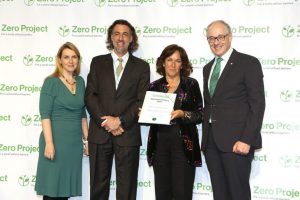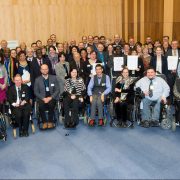Policies to improve access to work for people with disabilities awarded in Vienna
Hamburg, 27 February 2017 – One billion people worldwide live with a disability and have limited access to healthcare, education and employment. To counter their exclusion from the labour market, the government and the private sector can play a vital role. From February 22-24, over 500 participants attended the annual Zero Project Conference at the United Nations Office in Vienna to celebrate the most innovative policies and practices that improve the access to vocational training and work for persons with disabilities.

Above: Alexandra Wandel (left) and Martin Essl (right) hand over the award certificate to Chile’s More Capable Programme. Copyright: Zero Project
The Zero Project is a joint project by the Essl Foundation, the World Future Council and the European Foundation Centre that brings together experts with and without disabilities from all over the world to share best practices that improve the daily lives and legal rights for persons with disabilities. In total, sixty-seven innovative policies and practices that have advanced disability-inclusive employment and vocational education were awarded this year.
Winning policies include Ecuador’s programme that empowers persons with disabilities to become entrepreneurs and has already trained more than 4,300 people, as well as Canada’s Ready, Willing and Able Initiative which promotes awareness among employers and highlights the value of hiring employees with an intellectual disability or autism spectrum disorder. The initiative has so far facilitated 1,100 employment opportunities.
Jakob von Uexkull, WFC Founder, said: “We are proud to have established a global network of more than 3000 disability experts, which we have brought together during six high-level conferences to share and highlight best policies and practices for a world without barriers.”
The Zero Project was established to support the implementation of the United Nations Convention on the Rights of Persons with Disabilities (UN CRPD). Since the start of the cooperation in 2011, the World Future Council identified close to 70 Innovative Policies that have advanced the rights and lives of persons with disabilities in the fields of education, employment, accessibility, independent living and political participation. Each year, those policies were presented at the annual Zero Project Conferences at the United Nations Office in Vienna and awarded with global recognition. Whilst the first Zero Project Conference, in 2012, gathered only some 250 decision-makers, in 2017 more than 500 stakeholders from over 70 countries joined. In total, more than 3000 disability experts from over 150 countries were engaged and six Zero Project Reports have been published.
“The World Future Council has been a very valued partner in these past six years and without this cooperation the Zero Project would not be what it is. In particular, the policy research has been of enormous quality”, says Martin Essl, Chairman of the Essl Foundation.

Above: More than 500 stakeholders from all around the world attended this year’s Zero Project Conference 2017. Copyright: Zero Project
All Zero Project Reports can be found at: https://zeroproject.org/downloads/
More information about Zero Project Conferences is available at: https://conference.zeroproject.org/
Media contact
Miriam Petersen
Media & Communications Manager
Telephone: +49 40 307 09 14 19
miriam.petersen@worldfuturecouncil.org
About the Zero Project
The Zero Project promotes the rights of persons with disabilities globally, according to the principles and Articles of the UN Convention on the Rights of Persons with Disabilities (UN CRPD). It is a platform where the most innovative and effective solutions overcoming the barriers that persons with disabilities face, are being shared. Every year, the Zero Project concentrates on a theme: on inclusive education and ICTs (2016), on independent living and political participation (2015), on accessibility (2014) and on employment (2013). In 2017, the project concentrates on employment, vocational training and education. As of today, more than 3,000 experts around the world have contributed to the initiative. The Zero Project was initiated by the Essl Foundation in 2010 and has been running in partnership with the World Future Council since 2011 and with the European Foundation Centre since 2013. More information at: http://www.zeroproject.org
The World Future Council brings the interests of future generations to the centre of policy-making. Its up to 50 eminent members from around the globe have already successfully promoted change. The Council addresses challenges to our common future and provides decision makers with effective policy solutions. In close cooperation with civil society actors, parliamentarians, governments, business and international organizations the World Future Council identifies “best policies” around the globe. The World Future Council is registered as a charitable foundation in Hamburg, Germany.The World Future Council




